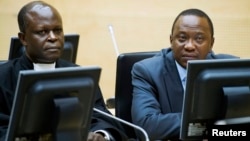The International Criminal Court (ICC) has again postponed the trial of Kenyan President Uhuru Kenyatta, this time until October 7.
This is the second time this year the court has delayed trying Kenyatta, who is charged with helping to organize deadly violence following Kenya's 2007 presidential election.
The court said the latest delay is to give Kenya's government more time to provide records sought by ICC prosecutors.
Earlier, prosecutors said they lacked sufficient evidence to go ahead with the trial, and alleged that witnesses had been bribed or pressured not to cooperate.
In an interview with VOA, Human Rights Watch's Richard Dicker outlined the problems faced by the prosecution.
"The prosecutor has alleged that a number of her witnesses have either been intimidated or disappeared under pressure exerted, supposedly by those close to President Kenyatta. I think another lesson to learn is if one is charging a senior official or indeed a president, it is imperative to bring a case that is as air-tight as possible," he said.
In a statement Monday, the court said it rejected a request from Kenyatta's legal team to terminate proceedings and a separate request from prosecutors to suspend the proceedings indefinitely.
Kenyatta faces charges of crimes against humanity for his alleged role in murders, persecution, rapes and other crimes in the aftermath of the election. His deputy, William Ruto, is currently on trial at the ICC for similar charges.
More than 1,100 people were killed in ethnic violence after the disputed 2007 election.
On Tuesday, Kenyatta begins a four-nation tour that includes attending a European Union-Africa summit in Brussels.
This is the second time this year the court has delayed trying Kenyatta, who is charged with helping to organize deadly violence following Kenya's 2007 presidential election.
The court said the latest delay is to give Kenya's government more time to provide records sought by ICC prosecutors.
Earlier, prosecutors said they lacked sufficient evidence to go ahead with the trial, and alleged that witnesses had been bribed or pressured not to cooperate.
In an interview with VOA, Human Rights Watch's Richard Dicker outlined the problems faced by the prosecution.
"The prosecutor has alleged that a number of her witnesses have either been intimidated or disappeared under pressure exerted, supposedly by those close to President Kenyatta. I think another lesson to learn is if one is charging a senior official or indeed a president, it is imperative to bring a case that is as air-tight as possible," he said.
In a statement Monday, the court said it rejected a request from Kenyatta's legal team to terminate proceedings and a separate request from prosecutors to suspend the proceedings indefinitely.
Kenyatta faces charges of crimes against humanity for his alleged role in murders, persecution, rapes and other crimes in the aftermath of the election. His deputy, William Ruto, is currently on trial at the ICC for similar charges.
More than 1,100 people were killed in ethnic violence after the disputed 2007 election.
On Tuesday, Kenyatta begins a four-nation tour that includes attending a European Union-Africa summit in Brussels.





